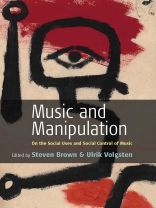Since the beginning of human civilization, music has been used as a device to control social behavior, where it has operated as much to promote solidarity within groups as hostility between competing groups. Music is an emotive manipulator that influences attitude, motivation and behavior at many levels and in many contexts. This volume is the first to address the social ramifications of music’s behaviorally manipulative effects, its morally questionable uses and control mechanisms, and its economic and artistic regulation through commercialization, thus highlighting not only music’s diverse uses at the social level but also the ever-fragile relationship between aesthetics and morality.
Содержание
Acknowledgements
Chapter 1. Ritual and Ritualization
Ellen Dissanayake
Chapter 2. Music, Identity, and Social Control
Peter J. Martin
Chapter 3. Between Ideology and Identity
Ulrik Volgsten
Chapter 4. Music in Business Environments
Adrian C. North and David J. Hargreaves
Chapter 5. The Social Uses of Background Music for Personal Enhancement
Steven Brown and Töres Theorell
Chapter 6. Music, Moving Images, Semiotics, and the Democratic Right to Know
Philip Tagg
Chapter 7. Music Video and Genre
Rob Strachan
Chapter 8. The Effectiveness of Music in Television Commercials
Claudia Bullerjahn
Chapter 9. Music Censorship from Plato to the Present
Marie Korpe, Ole Reitov and Martin Cloonan
Chapter 10. Orpheus in Hell
Joseph J. Moreno Chapter 11. The Changing Structure of the Music Industry
Roger Wallis
Chapter 12. Music and Reuse
Ola Stockfelt
Chapter 13. Copyright, Music, and Morals
Ulrik Volgsten and Yngve Akerberg
Notes on Contributors
Bibliography
Index
Об авторе
Ulrik Volgsten is a research fellow in the Department of Culture, Aesthetics and Media at Göteborg University in Sweden. He received his doctorate in the Department of Musicology at Stockholm University, and has published papers on both musical and philosophical topics. Volgsten’s multidisciplinary research mainly focuses on human communication in different media.












